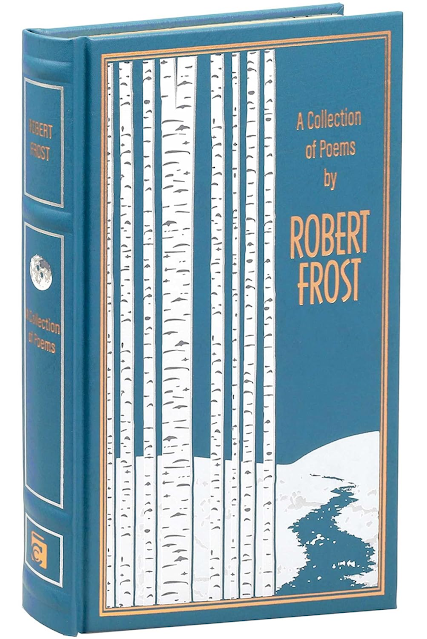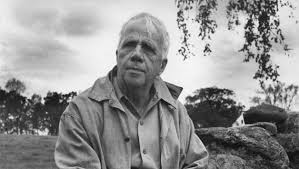"The Road Not Taken" is one of Frost's most popular works. Yet, it is a frequently misunderstood poem, often read simply as a poem that champions the idea of "following your own path". Actually, it expresses some irony regarding such an idea. A critique in the Paris Review by David Orr described the misunderstanding this way:"The poem's speaker tells us he "shall be telling", at some point in the future, of how he took the road less traveled … yet he has already admitted that the two paths "equally lay / In leaves" and "the passing there / Had worn them really about the same." So the road he will later call less traveled is actually the road equally traveled. The two roads are interchangeable."Frost wrote the poem as a joke for his friend Edward Thomas, who was often indecisive about which route to take when the two went walking.
A New York Times book review on Brian Hall's 2008 biography Fall of Frost states: "Whichever way they go, they're sure to miss something good on the other path." Regarding the "sigh" that is mentioned in the last stanza, it may be seen as an expression of regret or of satisfaction. However, there is significance in the difference between what the speaker has just said of the two roads, and what he will say in the future. According to Lawrance Thompson, Frost's biographer, as Frost was once about to read the poem, he commented to his audience, "You have to be careful of that one; it's a tricky poem—very tricky", perhaps intending to suggest the poem's ironic possibilities.
Thompson suggests that the poem's narrator is "one who habitually wastes energy in regretting any choice made: belatedly but wistfully he sighs over the attractive alternative rejected." Thompson also says that when introducing the poem in readings, Frost would say that the speaker was based on his friend Thomas. In Frost's words, Thomas was "a person who, whichever road he went, would be sorry he didn't go the other. He was hard on himself that way."
* * * * * * *
A Collection of Poems by Robert Frost (Leather-bound Classics) Leather Bound – October 8, 2019by Robert Frost (Author), Ken Mondschein (Introduction)
The early works of beloved poet Robert Frost, collected in one volume.
The poetry of Robert Frost is praised for its realistic depiction of rural life in New England during the early twentieth century, as well as for its examination of social and philosophical issues. Through the use of American idiom and free verse, Frost produced many enduring poems that remain popular with modern readers. A Collection of Poems by Robert Frost contains all the poems from his first four published collections: A Boy’s Will (1913), North of Boston (1914), Mountain Interval (1916), and New Hampshire (1923), including classics such as “The Road Not Taken,” “Fire and Ice,” and “Stopping by Woods on a Snowy Evening.” This handsome leather-bound volume is an elegant addition to every poetry lover’s shelf.
 |
| Photo by Hulton Archive/Getty Images |
Robert Frost wrote “The Road Not Taken” as a joke for a friend, the poet Edward Thomas. When they went walking together, Thomas was chronically indecisive about which road they ought to take and—in retrospect—often lamented that they should, in fact, have taken the other one. Soon after writing the poem in 1915, Frost griped to Thomas that he had read the poem to an audience of college students and that it had been “taken pretty seriously … despite doing my best to make it obvious by my manner that I was fooling. … Mea culpa.” However, Frost liked to quip, “I’m never more serious than when joking.” As his joke unfolds, Frost creates a multiplicity of meanings, never quite allowing one to supplant the other—even as “The Road Not Taken” describes how choice is inevitable.
“The Road Not Taken” begins with a dilemma, as many fairytales do. Out walking, the speaker comes to a fork in the road and has to decide which path to follow:
Two roads diverged in a yellow wood,And sorry I could not travel bothAnd be one traveler, long I stoodAnd looked down one as far as I couldTo where it bent in the undergrowth …
In his description of the trees, Frost uses one detail—the yellow leaves—and makes it emblematic of the entire forest. Defining the wood with one feature prefigures one of the essential ideas of the poem: the insistence that a single decision can transform a life. The yellow leaves suggest that the poem is set in autumn, perhaps in a section of woods filled mostly with alder or birch trees. The leaves of both turn bright yellow in fall, distinguishing them from maple leaves, which flare red and orange. Both birches and alders are “pioneer species,” the first trees to come back after the land has been stripped bare by logging or forest fires. An inveterate New England farmer and woodsman, Robert Frost would have known these woods were “new”—full of trees that had grown after older ones had been decimated. One forest has replaced another, just as—in the poem—one choice will supplant another. The yellow leaves also evoke a sense of transience; one season will soon give way to another.
The speaker briefly imagines staving off choice, wishing he could “travel both / And be one traveler.” (A fastidious editor might flag the repetition of travel/traveler here, but it underscores the fantasy of unity—traveling two paths at once without dividing or changing the self.) The syntax of the first stanza also mirrors this desire for simultaneity: three of the five lines begin with the word and.
After peering down one road as far as he can see, the speaker chooses to take the other one, which he describes as
… just as fair,And having perhaps the better claim,Because it was grassy and wanted wear;Though as for that, the passing thereHad worn them really about the same.
Later in the poem, the speaker calls the road he chose “less traveled,” and it does initially strike him as slightly grassier, slightly less trafficked. As soon as he makes this claim, however, he doubles back, erasing the distinction even as he makes it: “Though as for that the passing there / Had worn them really about the same.”
Frost then reiterates that the two roads are comparable, observing—this time—that the roads are equally untraveled, carpeted in newly fallen yellow leaves:
And both that morning equally layIn leaves no step had trodden black.
The poem masquerades as a meditation about choice, but the critic William Pritchard suggests that the speaker is admitting that “choosing one rather than the other was a matter of impulse, impossible to speak about any more clearly than to say that the road taken had ‘perhaps the better claim.’” In many ways, the poem becomes about how—through retroactive narrative—the poet turns something as irrational as an “impulse” into a triumphant, intentional decision. Decisions are nobler than whims, and this reframing is comforting, too, for the way it suggests that a life unfolds through conscious design. However, as the poem reveals, that design arises out of constructed narratives, not dramatic actions.
Having made his choice, the speaker declares, “Oh, I kept the first for another day!” The diction up until now has been matter-of-fact, focusing on straightforward descriptions and avoiding figurative language. This line initiates a change: as the speaker shifts from depiction to contemplation, the language becomes more stilted, dramatic, and old-fashioned. This tonal shift subtly illustrates the idea that the concept of choice is, itself, a kind of artifice.
Thus far, the entire poem has been one sentence. The meandering syntax of this long sentence—which sprawls across stanzas, doubling back on itself, revising its meaning, and delaying the finality of decisiveness—mirrors the speaker’s thought process as he deliberates. The neatness of how the sentence structure suddenly converges with the line structure (this sentence is exactly one line) echoes the sudden, clean division that choice creates.
As the tone becomes increasingly dramatic, it also turns playful and whimsical. “Oh, I kept the first for another day!” sounds like something sighed in a parlor drama, comic partly because it is more dramatic than the occasion merits: after all, the choice at hand is not terribly important. Whichever road he chooses, the speaker, will, presumably, enjoy a walk filled with pleasant fall foliage.
The poem’s tone also turns increasingly eerie, elusive, and difficult to grasp. As he does throughout the poem, the speaker makes a confident statement (“I saved the first for another day!”) only to turn back and revise it:
Yet knowing how way leads on to way,I doubted if I should ever come back.
Already, the speaker doubts he’ll ever return. Writing, as he was, for his friend Edward Thomas, Frost was perhaps thinking of one of Thomas’s most famous poems, “Roads.” Thomas, who was Welsh, lived in a country where roads built by the Romans two millennia previously were (and are) still in use. Some, now paved over, are used as highways, remnants of a culture that has long since vanished and been supplanted by another. In “Roads,” Thomas writes,
Roads go onWhile we forget, and areForgotten like a starThat shoots and is gone.
Later he imagines roads when people are absent:
They are lonelyWhile we sleep, lonelierFor lack of the travellerWho is now a dream only.
“The Road Not Taken” appears as a preface to Frost’s Mountain Interval, which was published in 1916 when Europe was engulfed in World War I; the United States would enter the war a year later. Thomas’s “Roads” evokes the legions of men who will return to the roads they left only as imagined ghosts:
Now all roads lead to FranceAnd heavy is the treadOf the living; but the deadReturning lightly dance.
Frost wrote this poem at a time when many men doubted they would ever go back to what they had left. Indeed, shortly after receiving this poem in a letter, Edward Thomas's Army regiment was sent to Arras, France, where he was killed two months later.
When Frost sent the poem to Thomas, Thomas initially failed to realize that the poem was (mockingly) about him. Instead, he believed it was a serious reflection on the need for decisive action. (He would not be alone in that assessment.)
Frost was disappointed that the joke fell flat and wrote back, insisting that the sigh at the end of the poem was “a mock sigh, hypo-critical for the fun of the thing.” The joke rankled; Thomas was hurt by this characterization of what he saw as a personal weakness—his indecisiveness, which partly sprang from his paralyzing depression. Thomas presciently warned Frost that most readers would not understand the poem’s playfulness and wrote, “I doubt if you can get anybody to see the fun of the thing without showing them & advising them which kind of laugh they are to turn on.” Edward Thomas was right, and the critic David Orr has hailed “The Road Not Taken” as a poem that “at least in its first few decades … came close to being reader-proof.”
The last stanza—stripped of the poem’s earlier insistence that the roads are “really about the same”—has been hailed as a clarion call to venture off the beaten path and blaze a new trail. Frost’s lines have often been read as a celebration of individualism, an illustration of Emerson’s claim that “Whoso would be a man, must be a nonconformist.” In the film Dead Poets Society, the iconoclastic teacher Mr. Keating, played by Robin Williams, takes his students into a courtyard, instructs them to stroll around, and then observes how their individual gaits quickly subside into conformity. He passionately tells them, “Robert Frost said, ‘Two roads diverged in a wood, and I—/ I took the one less traveled by / And that has made all the difference.’”
Far from being an ode to the glories of individualism, however, the last stanza is a riddling, ironic meditation on how we turn bewilderment and impulsiveness into a narrative:
I shall be telling this with a sighSomewhere ages and ages hence:Two roads diverged in a wood, and I—I took the one less traveled by,And that has made all the difference.
Again, the language is stylized, archaic, and reminiscent of fairytales. Frost claims he will be telling the story “somewhere ages and ages hence,” a reversal of the fairytale beginning, “Long, long ago in a faraway land.” Through its progression, the poem suggests that our power to shape events comes not from choices made in the material world—in an autumn stand of birches—but from the mind’s ability to mold the past into a particular story. The roads were about the same, and the speaker’s decision was based on a vague impulse. The act of assigning meanings—more than the inherent significance of events themselves—defines our experience of the past.
The fairytale-like language also accentuates the way the poem slowly launches into a conjuring trick. Frost liked to warn listeners (and readers) that “you have to be careful of that one; it’s a tricky poem—very tricky.” Part of its trick is that it enacts what it has previously claimed is impossible: the traveling of two roads at once.
The poem’s ending refuses to convey a particular emotional meaning; it playfully evades categorizations even as it describes divisions created by choices. Its triumph is that it does travel two emotional trajectories while cohering as a single statement. We cannot tell, ultimately, whether the speaker is pleased with his choice; a sigh can be either contented or regretful. The speaker claims that his decision has made “all the difference,” but the word difference itself conveys no sense of whether this choice made the speaker’s life better or worse—he could, perhaps, be envisioning an alternate version of life, one full of the imagined pleasures the other road would have offered.
Indeed, when Frost and Thomas went walking together, Thomas would often choose one fork in the road because he was convinced it would lead them to something, perhaps a patch of rare wild flowers or a particular bird’s nest. When the road failed to yield the hoped-for rarities, Thomas would rue his choice, convinced the other road would have doubtless led to something better. In a letter, Frost goaded Thomas, saying, “No matter which road you take, you’ll always sigh, and wish you’d taken another.”
And, indeed, the title of the poem hovers over it like a ghost: “The Road Not Taken.” According to the title, this poem is about absence. It is about what the poem never mentions: the choice the speaker did not make, which still haunts him. Again, however, Frost refuses to allow the title to have a single meaning: “The Road Not Taken” also evokes “the road less traveled,” the road most people did not take.
The poem moves from a fantasy of staving off choice to a statement of division. The reader cannot discern whether the “difference” evoked in the last line is glorious or disappointing—or neither. What is clear is that the act of choosing creates division and thwarts dreams of simultaneity. All the “difference” that has arisen—the loss of unity—has come from the simple fact that choice is always and inescapably inevitable. The repetition of I—as well as heightening the rhetorical drama—mirrors this idea of division. The self has been split. At the same time, the repetition of I recalls the idea of traveling two roads as one traveler: one I stands on each side of the line break—on each side of the verse’s turn—just as earlier when the speaker imagined being a single traveler walking down both roads at once.
The poem also wryly undercuts the idea that division is inevitable: the language of the last stanza evokes two simultaneous emotional stances. The poem suggests that—through language and artifice—we can “trick” our way out of abiding by the law that all decisions create differences. We can be one linguistic traveler traveling two roads at once, experiencing two meanings. In a letter, Frost claimed, “My poems … are all set to trip the reader head foremost into the boundless.” The meaning of this poem has certainly tripped up many readers—from Edward Thomas to the iconic English teacher in Dead Poets Society. But the poem does not trip readers simply to tease them—instead it aims to launch them into the boundless, to launch them past spurious distinctions and into a vision of unbounded simultaneity.
Katherine Robinson earned a BA from Amherst College, an MFA from The Writing Seminars at Johns Hopkins University. Her poetry and fiction have appeared in The Kenyon Review, The Hudson Review, Poet Lore, The Common and elsewhere. Her critical interests include the influence of mythology and bardic poetry on contemporary...













